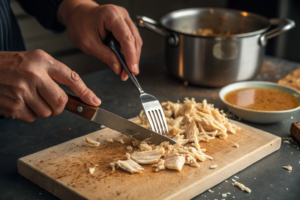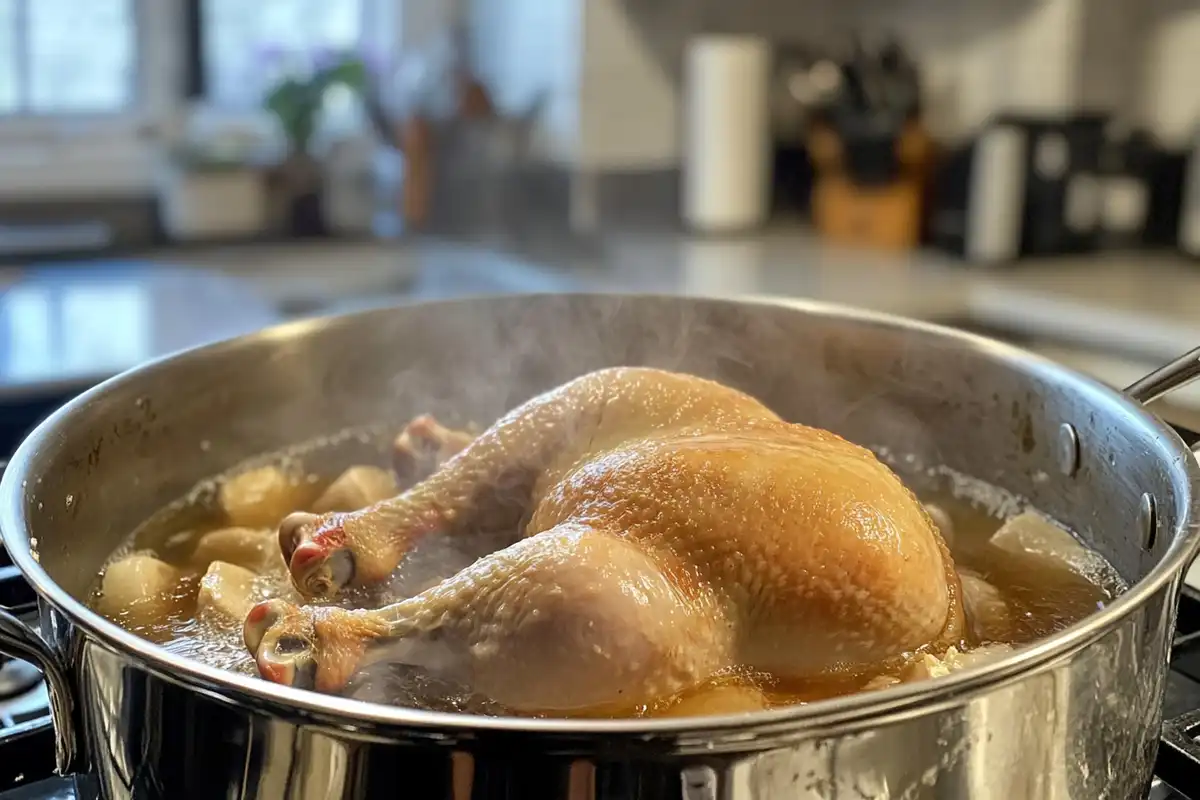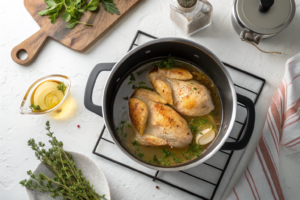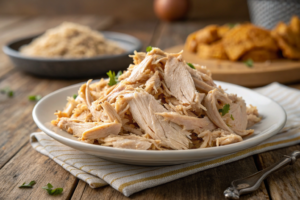Can boiling chicken lead to an undesirable, tough texture? This article explores the nuances of cooking chicken through boiling. Learn to achieve perfect results every time.
The Basics of Boiling Chicken
Boiling chicken is a simple cooking method. However, even this straightforward process has its subtleties. Indeed, it’s crucial to understand the potential for overcooking. Furthermore, overcooked chicken can become dry and rubbery. Accordingly, we’ll delve into how to avoid this.
Why Overcooking Occurs
Overcooking happens when chicken is boiled too long. Generally, this leads to protein coagulation. The proteins tighten up, thus squeezing out moisture. Ultimately, the chicken loses its tender texture. Because of this process, controlling cooking time is critical.
Can You Overcook Chicken When Boiling?
The answer is a definite yes. Specifically, the high temperature and prolonged submersion can lead to overcooking. Consequently, understanding how this happens is very important. For instance, even a few extra minutes can make a difference.
Signs of Overcooked Chicken
-
Texture becomes tough and rubbery
-
The chicken can be stringy
-
It lacks moisture and becomes dry
-
It may become difficult to chew.
How to Avoid Overcooking Boiled Chicken
Therefore, it’s vital to master the art of boiling chicken properly. First of all, you need to monitor it closely. Chiefly, use a meat thermometer.
Key Factors in Perfect Boiled Chicken
-
Water Temperature: Maintain a gentle simmer. Basically, avoid a rapid boil.
-
Cooking Time: Cook until the internal temperature reaches 165°F (74°C).
-
Thickness: Adjust cooking time based on chicken piece thickness.
-
Checking for Doneness: Use a thermometer in the thickest part of the chicken.
The Ideal Temperature for Boiling Chicken
Reaching the right temperature is critical. Indeed, the internal temperature must reach 165°F (74°C). Subsequently, the chicken will be safely cooked. Moreover, it will be perfectly juicy and tender.
Why Temperature Matters
Using a food thermometer is essential. In particular, it ensures the chicken is cooked thoroughly. Furthermore, it prevents overcooking by measuring the internal temperature precisely. Afterward, remove the chicken from the heat.
Can You Overcook Chicken When Boiling? Common Mistakes
Many mistakes can lead to overcooked chicken. For example, cooking at a too-high temperature is one. Also, leaving the chicken too long in the boiling water is another common error. Therefore, knowledge of common mistakes helps prevent overcooking.
Common Errors
-
Using too high heat setting.
-
Overlooking the importance of cooking time.
-
Not checking the internal temperature.
-
Boiling the chicken for too long.
Step-by-Step Guide for Perfect Boiled Chicken
Here’s a reliable guide to help you achieve perfectly boiled chicken. Firstly, gather your materials. Then, follow the steps closely.
Preparation and Setup
-
Choose fresh, boneless, skinless or bone-in chicken.
-
Place the chicken pieces in a pot or pan.
-
Cover the chicken with cold water.
-
Optionally, add herbs, salt, and spices for extra flavor.
Cooking Process
-
Bring the water to a gentle simmer over medium-high heat.
-
Reduce heat to low, and ensure the water is simmering, not rapidly boiling.
-
Simmer until the chicken reaches an internal temperature of 165°F (74°C).
-
Remove the chicken and let it rest before using.
Post-Cooking Care
-
Allow the cooked chicken to rest briefly.
-
Shred or slice the chicken as needed.
-
Use it in your favorite dishes.
Can You Overcook Chicken When Boiling? and the Impact of Cooking Time
Cooking time significantly affects the texture of boiled chicken. Specifically, each additional minute can change the outcome. Accordingly, understanding the impact of cooking time is essential.
Timing and Chicken Tenderness
-
Under-cooked chicken is unsafe to eat, therefore always check internal temperature.
-
Properly cooked chicken is tender and juicy.
-
Overcooked chicken is dry and tough.
-
Adjust cooking time based on the thickness of the chicken pieces.
-
Can you overcook chicken when boiling?
Flavor Enhancements When Boiling Chicken
While boiling is a straightforward cooking method, adding flavor is essential. Basically, even a simple addition can enhance the flavor. Ultimately, flavoring can elevate your boiled chicken.
Herbs and Spices
-
Bay leaves add a subtle earthy flavor.
-
Garlic cloves provide a savory element.
-
Onion slices contribute to a rich taste.
-
Salt and pepper help enhance the overall flavor profile.
Other Flavoring Techniques
-
Add a lemon slice or vinegar for a zesty flavor
-
Use chicken broth instead of water for more depth
-
Introduce aromatic vegetables like carrots and celery
Utilizing Boiled Chicken in Recipes
Boiled chicken is a versatile ingredient. Indeed, you can incorporate it in many recipes. Specifically, it’s a great base for soups, salads, and sandwiches. Moreover, it’s a healthy source of protein.
Recipe Ideas
-
Chicken Noodle Soup: A comforting classic.
-
Chicken Salad: Perfect for a light lunch or snack.
-
Chicken and Rice: A simple yet satisfying meal.
-
Chicken Enchiladas: A flavorful dish with tortillas and sauce.
The Science Behind Boiling Chicken
Understanding the science behind boiling chicken helps achieve perfect results. Essentially, the proteins react differently to heat over time. Conversely, this reaction impacts the texture. Hence, understanding these reactions is crucial.
Protein Coagulation
When heat is applied to proteins, they coagulate. Therefore, this process alters the structure. Additionally, overcooking leads to excessive coagulation. Consequently, this causes the chicken to become tough.
Moisture Loss
As the proteins coagulate, moisture is squeezed out. Accordingly, this moisture loss causes the chicken to dry out. Thus, controlling cooking time helps retain moisture. Furthermore, it keeps the chicken tender.
Equipment Needed for Boiling Chicken
Having the right equipment is essential. Especially, it ensures your chicken cooks evenly. Comparatively, having the right pot makes it easier.
Essential Tools
-
Stockpot or Large Pot: For holding the chicken and water.
-
Meat Thermometer: To check the internal temperature.
-
Tongs or Slotted Spoon: To remove the chicken safely.
-
Cutting Board: For shredding or slicing the chicken.

Troubleshooting Common Issues
Even with careful cooking, issues can arise. Generally, some common problems are easily fixed. Therefore, learning to address these issues is important.
Addressing Overcooked Chicken
If the chicken is overcooked, try shredding it. Specifically, use it in dishes with plenty of moisture. For instance, add it to soups or stews. Besides, you can mix it with sauces or dressings.
Handling Undercooked Chicken
If the chicken is undercooked, return it to the pot. Specifically, boil it for a few more minutes. Meanwhile, make sure the internal temperature reaches 165°F (74°C). Ultimately, use a meat thermometer to double-check.
Health Benefits of Boiled Chicken
Boiled chicken provides excellent nutritional value. Notably, it’s a good source of protein. Furthermore, it’s low in fat when cooked without skin. Ultimately, it’s a healthy addition to your diet.
Nutritional Information
-
Lean Protein: Essential for building and repairing tissues.
-
Low Fat: Great for weight management.
-
Vitamins and Minerals: Provides essential nutrients.
Tips for Meal Prepping with Boiled Chicken
Boiled chicken is an excellent option for meal prepping. Indeed, it’s versatile and easy to store. Specifically, you can prepare a large batch and use it throughout the week.
Storage Tips
-
Store cooked chicken in an airtight container.
-
Keep it in the refrigerator for up to 3-4 days.
-
Freeze for longer storage up to 3 months.
-
Label your containers with the date of preparation.
The Impact of Chicken Quality on Boiling
The quality of the chicken affects the outcome. Accordingly, selecting good-quality chicken is essential. In particular, fresh chicken is preferred. Moreover, pay attention to the chicken’s color and scent.
Factors to Consider
-
Choose fresh chicken from a reputable source.
-
Look for chicken with a pinkish color.
-
Avoid chicken with a foul odor.
-
Select the appropriate cut for your needs.
Boiling Chicken vs. Other Cooking Methods
Boiling is just one way to cook chicken. However, it differs from other methods like baking and grilling. Accordingly, each technique offers different results.
Advantages of Boiling
-
Simple and straightforward process.
-
Requires minimal oil or fat.
-
Great for preparing shredded chicken.
Disadvantages of Boiling
-
Can lead to bland flavor.
-
May result in a less appealing texture if overcooked.
-
Requires additional flavor enhancers.
Advanced Techniques for Boiling Chicken
While the basic method is simple, you can use advanced techniques. Specifically, these techniques can enhance the flavor and texture. Ultimately, this elevates your boiled chicken.
Specialized Approaches
-
Poaching: Simmer chicken gently in liquid.
-
Sous Vide: Cook in a water bath at a controlled temperature.
-
Brining: Soak the chicken in a salt solution before boiling.
Adapting the Boiling Method for Different Diets
Boiled chicken can be adapted for various dietary needs. Basically, it’s versatile and easy to customize. Ultimately, everyone can enjoy it.
Dietary Considerations
-
Low-carb: Pair with non-starchy vegetables.
-
High-protein: Add it to salads, soups, or wraps.
-
Gluten-free: Make sure any added ingredients are gluten-free.
Common Variations on Boiled Chicken
There are different ways you can prepare boiled chicken. For example, some people might prefer different herbs and spices. Moreover, the liquid used can be altered as well.
Regional Influences
-
Asian-style boiled chicken: Uses soy sauce and ginger.
-
Mediterranean-style boiled chicken: Uses lemon and herbs.
-
Mexican-style boiled chicken: Uses chili powder and cumin.
Can You Overcook Chicken When Boiling? and Best Practices
To sum it all, yes, you can overcook chicken when boiling. However, with the right methods you can achieve perfect results every time. Specifically, monitoring cooking times and temperatures is key.
The Importance of Precision
-
Use a meat thermometer to check the internal temperature.
-
Monitor cooking time closely.
-
Maintain a gentle simmer.
Frequently Asked Questions (FAQs)
What is the ideal water temperature for boiling chicken?
The ideal water temperature for boiling chicken is a gentle simmer, not a rolling boil. This prevents the chicken from becoming tough and rubbery due to the excessive agitation of a full boil.
How long does it typically take to boil chicken?
The time to boil chicken varies depending on the size and thickness of the chicken pieces. Typically, it takes about 10 to 20 minutes for chicken breasts or thighs to reach an internal temperature of 165°F (74°C).
Is it safe to boil frozen chicken?
While you can boil frozen chicken, it’s recommended to thaw it first. Thawing ensures more even cooking and prevents parts from overcooking while other parts remain raw. If you must cook frozen chicken, add a few more minutes to the cooking time and check the internal temperature frequently.
What are the signs of overcooked boiled chicken?
Overcooked boiled chicken will be tough, dry, stringy, and potentially rubbery. It may also be harder to chew and lack its normal juicy texture.
Can I add vegetables while boiling chicken?
Yes, you can add vegetables while boiling chicken. This infuses more flavor into both the chicken and the broth. Root vegetables like carrots, potatoes, and celery work very well.
How should I store leftover boiled chicken?
Leftover boiled chicken should be stored in an airtight container in the refrigerator for up to 3-4 days. Alternatively, you can freeze the chicken in freezer-safe bags or containers for up to 3 months.
Can I use the water after boiling chicken?
Yes, the water after boiling chicken can be used as a flavorful broth. It is great for making soups, stews, or cooking rice. Simply strain the liquid to remove any solids.
How can I prevent boiled chicken from being bland?
To prevent boiled chicken from being bland, you can add herbs, spices, and aromatics to the water, like bay leaves, garlic, onions, or peppercorns. You can also use chicken broth instead of water for a richer flavor.
What’s the best way to shred boiled chicken?
The best way to shred boiled chicken is to use two forks or even your hands, pulling the meat apart once it has cooled slightly. You can also use a stand mixer with a paddle attachment to make shredding faster.
Recipe: Perfect Boiled Chicken
Ingredients:
-
1 pound boneless, skinless chicken breasts or thighs
-
6 cups cold water or chicken broth
-
1 teaspoon salt
-
½ teaspoon black pepper
-
2 cloves garlic, minced
-
1 bay leaf
-
1 onion, quartered (optional)
-
1 carrot, roughly chopped (optional)
-
1 celery stalk, roughly chopped (optional)
Instructions:
-
Prepare the Pot: Place the chicken in a large pot or Dutch oven.
-
Add Liquids and Flavorings: Pour cold water or chicken broth over the chicken, ensuring it is completely submerged. Add salt, pepper, minced garlic, and bay leaf. Optionally, add quartered onion, chopped carrots, and celery for extra flavor.
-
Bring to a Simmer: Place the pot over medium-high heat and bring the water to a gentle simmer. Reduce the heat to low as soon as small bubbles appear consistently.
-
Simmer Gently: Cover the pot and simmer gently for 10-20 minutes or until the internal temperature of the chicken reaches 165°F (74°C).
-
Check for Doneness: Use a meat thermometer inserted into the thickest part of the chicken to ensure it’s fully cooked.
-
Remove from Heat: Once cooked, carefully remove the chicken from the pot using tongs or a slotted spoon.
-
Rest: Place the chicken on a cutting board and let it rest for a few minutes before shredding, slicing or using in your recipe.
-
Strain the Broth: Optionally, strain the cooking liquid through a fine-mesh sieve to remove the solids, and use the broth for soups or other recipes.
Nutritional Content (per 100g)
| Nutrient | Amount (Approximate per 100g) |
|---|---|
| Calories | 165 kcal |
| Protein | 30 g |
| Fat | 3.6 g |
| Saturated Fat | 1 g |
| Cholesterol | 85 mg |
| Sodium | 70 mg |
| Potassium | 350 mg |


